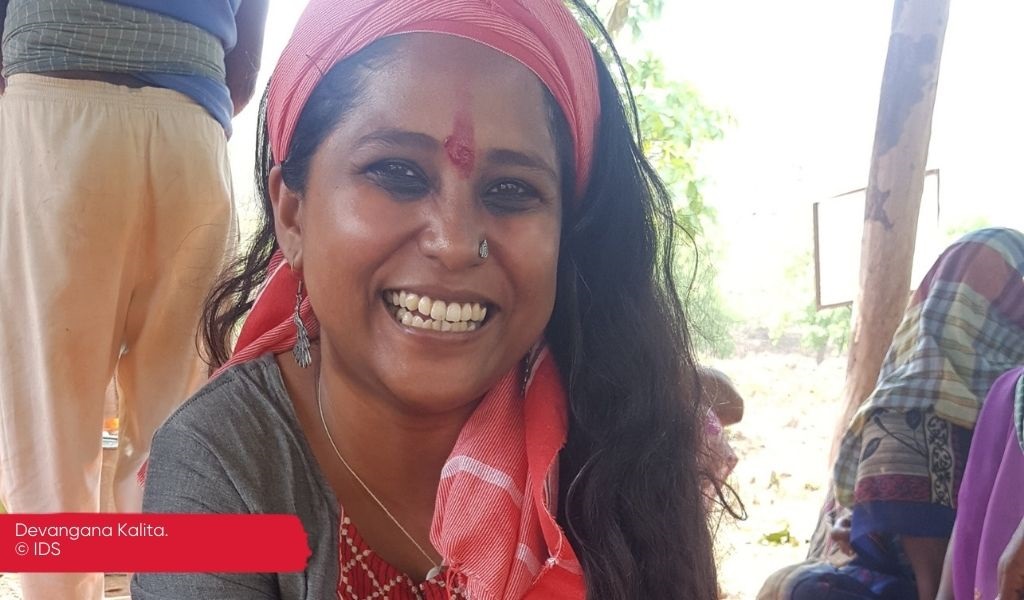Devangana Kalita, a graduate of the Institute of Development Studies (IDS), the leading global institute for development studies, has been held in prison in India since May 2020. Devangana was arrested alongside several others including fellow activist Natasha Narwal, for participating in peaceful protests against the Citizen Amendment Act (CAA) in Delhi. She was later charged under the draconian Unlawful Activities Prevention Act (UAPA) – an anti-terror law – and held in Tihar Jail without bail.
A talented young academic with a passion for women’s rights and social justice, for the past nine months Devangana has been studying for an MPhil-PhD from her prison cell.

Since graduating from IDS in 2011 with a Master’s in Gender and Development, Devangana has worked as a development researcher before continuing her studies in India with an MA in Modern Indian History. She is currently studying for her MPhil-PhD at the Centre for Women’s Studies at Jawaharlal Nehru University (JNU). With the help of her lawyers, friends and family, she has been able to secure access to the books and academic materials she needs and continues to study despite difficult circumstances within prison. Court orders have secured her access to a computer, which she is able to use for a few hours a day to work on her dissertation.
Committed women’s rights activist
Alongside her studies, which focus on the history of oppression and struggle of women tea plantation workers in Assam, she has been a committed women’s rights activist and social justice advocate for all in a secular and democratic India.
Devangana is a founding member of Pinjra Tod (‘break the cage’), which was started in 2015 to improve the conditions faced by women university students in Delhi through mass campaigns and agitations. Pinjra Tod campaigned on issues such as unfair living arrangements, discriminatory rules for women, such as curfews, as well as safety concerns and sexual harassment. This action was taken despite growing personal risk to Pinjra Tod members, who face challenges from right-wing student movements seeking to close democratic spaces within universities.
It was during this work to try and improve conditions for young women from diverse backgrounds that Devangana and a number of other students participated in the anti CAA movement in February 2020 – and which she is now in prison for.
Devangana has been charged under four cases covering various sections of the Indian Penal Code, including the Arms Act, Prevention of Damage to Public Property Act and the Unlawful Activities Prevention Act (UAPA), even though no solid evidence has been presented to substantiate the allegations. She was granted bail in three of the four cases against her except the one containing the more serious UAPA provisions, which significantly restricts any right to bail. She now has the right to appeal to the Delhi High Court and the Supreme Court for grant of bail as she awaits the trial. Alongside her studies, she is also using her time in prison to campaign for prison reforms, including calling for conditions such as social distancing, video conferencing and access to medical care, during the Covid-19 pandemic.
More human rights activists arrested
The increase in arrests of human rights activists over the past 12 months, many of whom are courageous young women like Devangana, is a worrying escalation of closing civic space for a country famously known as the world’s largest democracy. It includes the arrest and torture of Dalit activists for workers’ rights. The recent arrest of a young woman climate activist for supporting the farmers’ protests on social media is another example of this concerning trend, which is also part of a wider global picture.
The twenty-first century has so far been punctuated by events and actions that have undermined democratic norms and efforts to strengthen accountability. Alongside a growing distrust of democratic institutions, there have also been citizen-led demands for accountability and a rise in social movements. However, in response to these citizen-led demands, and in parallel to the global pandemic, there have also been many examples of the use of force to suppress peaceful protest (both online and offline). We have seen force used against Black Lives Matter protestors in the US, and against citizen protesters calling for greater democracy in Hong Kong, Thailand, and Myanmar.
Staff at the Institute of Development Studies have expressed their solidarity with Devangana and concern for the other activists arrested and imprisoned in India for peaceful protest.
Professor Melissa Leach, Director, Institute of Development Studies, said:
“It continues to be deeply distressing that Devangana and her fellow activists have been held in prison without bail, for almost a year now. These young academics are committed to social justice, civic rights and a democratic future for India, and we call for their immediate release.
“Devangana was awarded a distinction for her degree at IDS and staff remember her as highly intelligent, personable and vivacious with a strong commitment to rights of workers, tribal and displaced people.
“At IDS we strive to work with partners and alumni to build on decades of research, learning and teaching that builds solidarities for fighting for social and gender justice and for supporting democratic futures, in which people have a say over the decisions that affect their lives.”
The Institute for Development Studies is committed to a more equal and sustainable world where people everywhere can live their lives free from poverty and injustice. Through research, teaching and learning, IDS seeks to nurture inclusive, democratic and accountable societies.